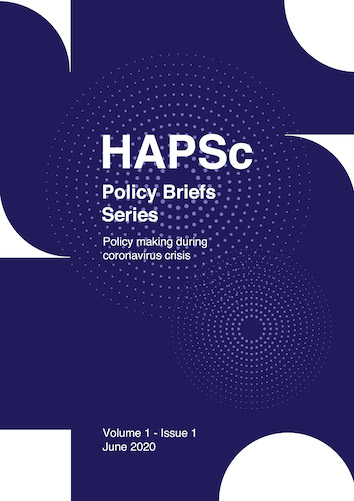Postmodernism versus state during pandemic period. The case of Poland
Abstract
The last few months because of COVID-19 pandemic we were able to observe the new challenge for nation states, state’s structures and their leaders. Moreover, in the whole world, governments still have to reorganise the states’ functioning and adapt new tools and solutions to unknown conditions. As usually, unpredictable issues push the states to modernisation and enquire searching more and more convenient transformation of the state’s structure. What is more, this dynamic challenge, which creates an unavoidable situation, betray the weakest and the strongest faces of each state in the world. This text is focused on the European experiences and pays the readers’ attention on the examples of European state’s reactions in the face of pandemics. The aim of the author is to show the issues which appeared visibly and undoubtedly in European states’ functioning on the example of particular decisions and actions taken the last few weeks.
Article Details
- How to Cite
-
Jakimowicz-Pisarska, I. (2020). Postmodernism versus state during pandemic period. The case of Poland. HAPSc Policy Briefs Series, 1(1), 24–29. https://doi.org/10.12681/hapscpbs.24943
- Section
- Articles

This work is licensed under a Creative Commons Attribution 4.0 International License.
Authors retain copyright and grant the journal right of first publication with the work simultaneously licensed under a Creative Commons Attribution License that allows others to share the work with an acknowledgement of the work's authorship and initial publication in this journal.Downloads
Download data is not yet available.
References
Barut, A. (2017). Postmodernistyczna struktura, hermeneutyczny autorytet, czyli polityczne implikacje dwóch ponowoczesnych odmian konstruktywizmu. Political Dialogues, 22/2017. Available at: apcz.umk.pl/czasopisma/index.php/DP/article/view/DP.2017.005 (Accessed: June 15, 2020).
Bauman, Z. (1995). Wieloznaczność nowoczesna. Nowoczesność wieloznaczna. Warsaw: Wydawnictwo Naukowe PWN.
Berendt, J. and Santora, M. (2020). Pandemic Forces Poland to Delay Presidential Election, New York Times, 7.05.2020. Available at: https://www.nytimes.com/2020/05/07/world/europe/poland-presidential-election-coronavirus.html (Accessed: June 3, 2020).
Bernacki, W. (2000). Od modernizmu do postmodernizmu. Kraków: Arcana.
Błesznowski, B. (2016). Antyhumanistyczna teoria polityki w myśli Michela Foucaulta. Krakow: Zakład Wydawniczy Nomos.
Blok, Z. (2018). Teoretyczne i metodologiczne problemy politologii związanych z badania państwa. In: Pietraś, M., Hofman, I. & Michałowiski, S. (eds.), Państwo w czasie zmiany. Lublin, 29A.
Czaputowicz, J. (2007). Teorie stosunków międzynarodowych. Krytyka i systematyzacja, Warsaw.
Devetak, R. (2006). Postmodernizm. In: Teorie stosunków międzynarodowych. In: Burchill, S., Devetak, R., Linklater, A., Paterson, M., Reus-Smith, C., True, T. (eds.), Teorie stosunków miêdzynarodowych. Warsaw: t³. P. Frankowski, 240-245.
Filerowicz, M. (2020). Democracy on Pause in Pandemic Poland. The Ruling Party Takes Advantage of Lockdown Foreign Affairs, 13.05.2020. Available at: https://www.foreignaffairs.com/articles/europe/2020-05-13/democracy-pause-pandemic-poland (Accessed: June 10, 2020).
Foucault, M. (2000). Rządomyślność. In: Filozofia, historia, polityka. Wybór pism, Warsaw – Wrocław: Wydawnictwo Naukowe PWN.
Foucault, M. (2010). Bezpieczeństwo, terytorium, populacja. Warsaw: Wydawnictwo Naukowe PWN.
Freedom House (2020). Poland. Available at: https://freedomhouse.org/country/poland/nations-transit/2020 (Accessed: June 8, 2020).
Kuźniarz, B. (2011). Zrozumieć postmodernizm. Sceptycyzm i socjalizm od Rousseau do Foucaulta. Toruń.
Habermas, J. (2014). Rzecz o kondycji i ustroju Europy. Łódź: Wydawnictwo Uniwersytetu Łódzkiego.
Hahne, P. (2007). Dość tej zabawy. Koniec społeczeństwa przyjemności. Katowice: Wydawnictwo: Księgarnia Świętego Jacka.
Kubera, J. (2014). Metamodernistyczna oscylacja lub podmiot i tożsamość po postmodernizmie. Available at: rcin.org.pl/Content/62043/WA248_79093_P-I-2524_kubera-metamodern_o.pdf. (Accessed: June 10, 2020).
Ptaszek, R.T. (2009). Bezpieczeństwo człowieka a transdyscyplinowość. In: Jarmoch, E., Świderski, A. W., Trzpil, I. A. & Siedlce T. L. (eds.), Bezpieczeństwo człowieka a transdyscyplinowość. Siedlice: Akademia Podlaska, Wydział Humanistyczny, Drohiczyńskie Towarzystwo Naukowe, 175-185.
Wendt, A. (2008). Społeczna teoria stosunków międzynarodowych (Social Theory of International Relations). Warsaw: Wydawnictwo Naukowe.



